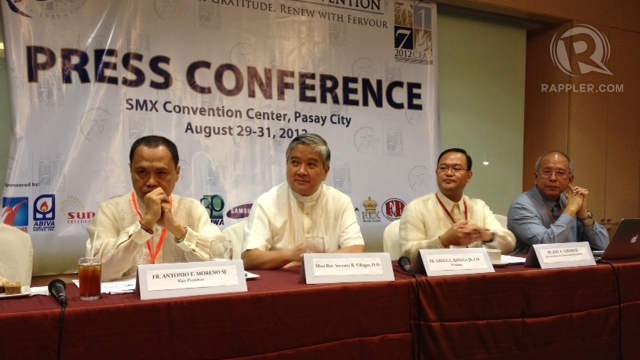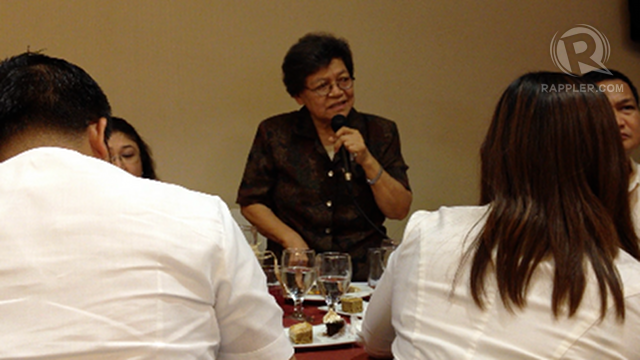SUMMARY
This is AI generated summarization, which may have errors. For context, always refer to the full article.

MANILA, Philippines – Catholic-schooled high-profile individuals who figure in scandals, face corruption charges, and get impeached are giving their alma maters the chills.
In a recent annual convention of the Catholic Educational Association of the Philippines (CEAP), top officials of the group admitted that stories about how some of their graduates “hurt society” have led them to ponder if they are “not doing the job well enough.”
“It is really a cause for great concern,” said CEAP national advocacy commission chair Fr Joel Tabora in a press conference on August 29 when asked to comment about prominent individuals who graduated from schools that proudly brand themselves as Catholic.
These personalities include students from Ateneo de Manila University, such as former President Joseph Estrada who left office after a street revolt; former President Gloria Arroyo who was among the most unpopular leaders of the country after a series of corruption scandals that rocked her administration; former First Gentleman Mike Arroyo who has been linked to several reported wrongdoings involving public officials; former Ombudsman Merceditas Gutierrez who resigned amid an impeachment complaint against her; and recently dismissed former Chief Justice Renato Corona.
Now Pampanga representative, Gloria Arroyo also studied and taught at Assumption College, while Corona, who was found guilty of betraying public trust, has a doctorate in law, summa cum laude, from University of Santo Tomas, the oldest Catholic school in the Philippines.
Very serious
Tabora, also president of Ateneo de Davao University, said an archbishop pointed this out to him several times.
“You have a wonderful school, but look, so often, products of your school hurt society,” Tabora said, quoting the archbishop. “And that is something, I think, which we educators have to take very seriously.”
“I think we are not doing the job well enough,” Tabora said.
It was a reality check for the Philippines’ biggest association of Catholic schools, which gathered in Pasay City from August 29 to 31 to discuss common objectives and strategies.
A 7-decade-old organization, CEAP is composed of over 1,200 members, including some of the Philippines’ most respected schools. (Watch more in the video.)
Families pose problem
CEAP vice president Fr Antonio Moreno said a big part of the problem comes from the family.
Earlier, Pope Benedict XVI had also warned about “the relentless rhythms of the modern world” that could challenge families. In particular, Benedict XVI cautioned families against the modern-day “utilitarian concept of work, production, and the market,” bringing “ferocious competition, strong inequalities, degradation of the environment, the race for consumer goods, family tensions.”
“The family now is getting more and more vulnerable, which was not true before. So it makes the task of Catholic education even more difficult and complex, because you cannot just teach a child in school, and not mind what’s going on in the family,” said Moreno, president of Ateneo de Zamboanga University.
CEAP’s director for the Cordillera Administrative Region, Sr Lourdes Dulay, agreed with Moreno, and also noted the need for a supportive community.
“Right now, more often than not, the children have no members of their family around, from as early as right after birth, or a few weeks after birth. And therefore, it is necessary for us to create an atmosphere and a community around the children that will help them develop the capacity to arrive at decisions even at an early age,” Dulay said.

The nun, who is also the directress of St Louis School in Baguio City, stressed the need for community activities “that will really engage the elders… to walk with the children.”
“The child’s character is formed by the community in which the child lives,” Dulay explained.
Hope for schools
But not all is unwell for Catholic schools. The bad fruits, in fact, only form part of the picture, said CEAP president Fr Gregorio Bañaga Jr.
The bad fruits “are not even 1%,” said Bañaga, noting that schools cannot dictate on their students’ conscience and free will.
“There are millions of Filipinos who are doing their jobs, including politicians, who came from Catholic schools and are steeped in the values of Catholicism, of their faith. These are unheralded people. However, they are also heroes in their own way. Why don’t we focus on them?” said Bañaga, president of Adamson University.
Tabora, who used to be president of Ateneo de Naga University, cited a respected figure who came from Naga City. He said a graduate of Ateneo de Naga High School – the late Interior Secretary Jesse Robredo – provides a good example.
Ateneo de Naga students called Robredo a “model Atenean” during a march in his honor almost two weeks ago. In a Thought Leaders piece for Rappler, Robredo’s fellow Ateneo graduate, Tony La Viña, described the late secretary as “truly a man for others.” (Watch more in the video.)
Tabora also called the new chief justice, Maria Lourdes Sereno, “a wonderful example of a product of Catholic education.” “She has been trained, I think, in prayer and spirituality and depth, and the various disciplines,” he explained.
Catholic schools play a crucial role in the Philippines, where many, if not most, leaders come from sectarian institutions. “The role of Catholic education in forming leaders is a serious role, and I don’t think it’s something which can be dismissed,” Tabora explained.
Success or failure? It depends on the graduates they produce. – Rappler.com
Related stories:
Add a comment
How does this make you feel?
There are no comments yet. Add your comment to start the conversation.